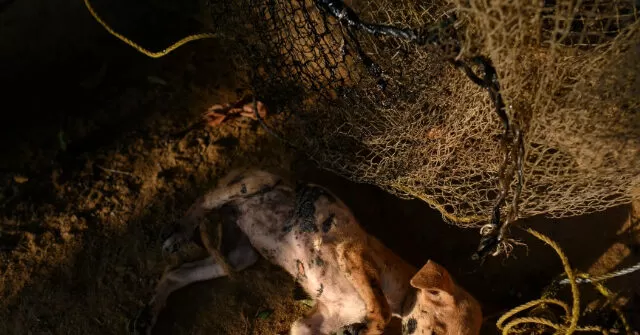Environmentalists in Venezuela are raising concerns over the state of Lake Maracaibo, a once thriving body of water now plagued by a disturbing sight – oil-covered dead animals. This recent discovery has been attributed to the mismanagement of the lake by the country’s socialist government, causing irreversible damage to the environment and its inhabitants.
Located in the northern part of Venezuela, Lake Maracaibo has long been considered a national treasure due to its rich biodiversity and economic significance. It is the largest lake in South America and one of the oldest in the world, covering an area of over 13,000 square kilometers. The lake is home to numerous species of fish, birds, and other marine animals, making it a vital ecosystem for the country.
However, in recent years, the once pristine lake has become a victim of socialist mismanagement. The government’s policies and lack of proper environmental regulations have led to the pollution of the lake, causing detrimental effects on its inhabitants. The most recent evidence of this is the discovery of dead animals covered in oil, sending shockwaves throughout the country.
Environmentalists and local communities have reported finding dead fish, birds, and even larger animals like dolphins and manatees washed up on the lake’s shores. These animals are not only suffering from the toxic effects of the oil but also from the lack of oxygen in the water due to the overgrowth of algae, caused by the unchecked pollution. These alarming incidents are a clear indication of the disastrous state of Lake Maracaibo, thanks to the government’s inability to protect and preserve it.
The current situation in Lake Maracaibo is a direct result of the socialist government’s negligence and prioritization of short-term economic gains over the environment’s well-being. The country’s oil industry, which is the main source of revenue for the government, has been operating without proper regulations, leading to the constant leakage of oil into the lake. The lack of proper waste management facilities and the illegal dumping of toxic chemicals by industries have also contributed to the pollution of the lake.
The consequences of this environmental crisis extend beyond the loss of animal life. The contaminated water poses a severe threat to the health and well-being of the local communities that depend on the lake for their livelihoods. Fishermen have reported a significant decline in their catch, affecting their income and food supply. The toxic algae has also contaminated the water supply, making it unsafe for consumption and causing health issues for those who rely on it for their daily needs.
The situation at Lake Maracaibo is a wake-up call for the Venezuelan government to prioritize the protection and preservation of the environment. The country’s natural resources should not be sacrificed for short-term economic gains, as the consequences are far-reaching and irreversible. It is the responsibility of the government to implement strict regulations and enforce them to ensure the sustainable use of resources.
Environmentalists and concerned citizens are urging the government to take immediate action to address the pollution in Lake Maracaibo. This includes investing in proper waste management facilities, enforcing stricter regulations on industries, and promoting sustainable practices. The government must also seek assistance from international organizations to help in the clean-up efforts and prevent further damage to the lake.
In conclusion, the situation at Lake Maracaibo is a grim reminder of the devastating effects of government mismanagement on the environment. The oil-covered dead animals are a symbol of the irreversible damage caused by the government’s negligence. The Venezuelan government must take immediate action to address this crisis and work towards the sustainable use of resources to prevent such incidents from happening in the future. It is time for the government to prioritize the protection of the environment for the well-being of its citizens and future generations. Only then can the once thriving Lake Maracaibo be restored to its former glory.





![Complete BritRail Pass Guide [Types, How to Use It, Pros + Cons]](https://inside-news.uk/wp-content/uploads/2025/06/00221EB4-BCA2-4DBB-6CD4-83DBC37D71FA-120x86.webp)











